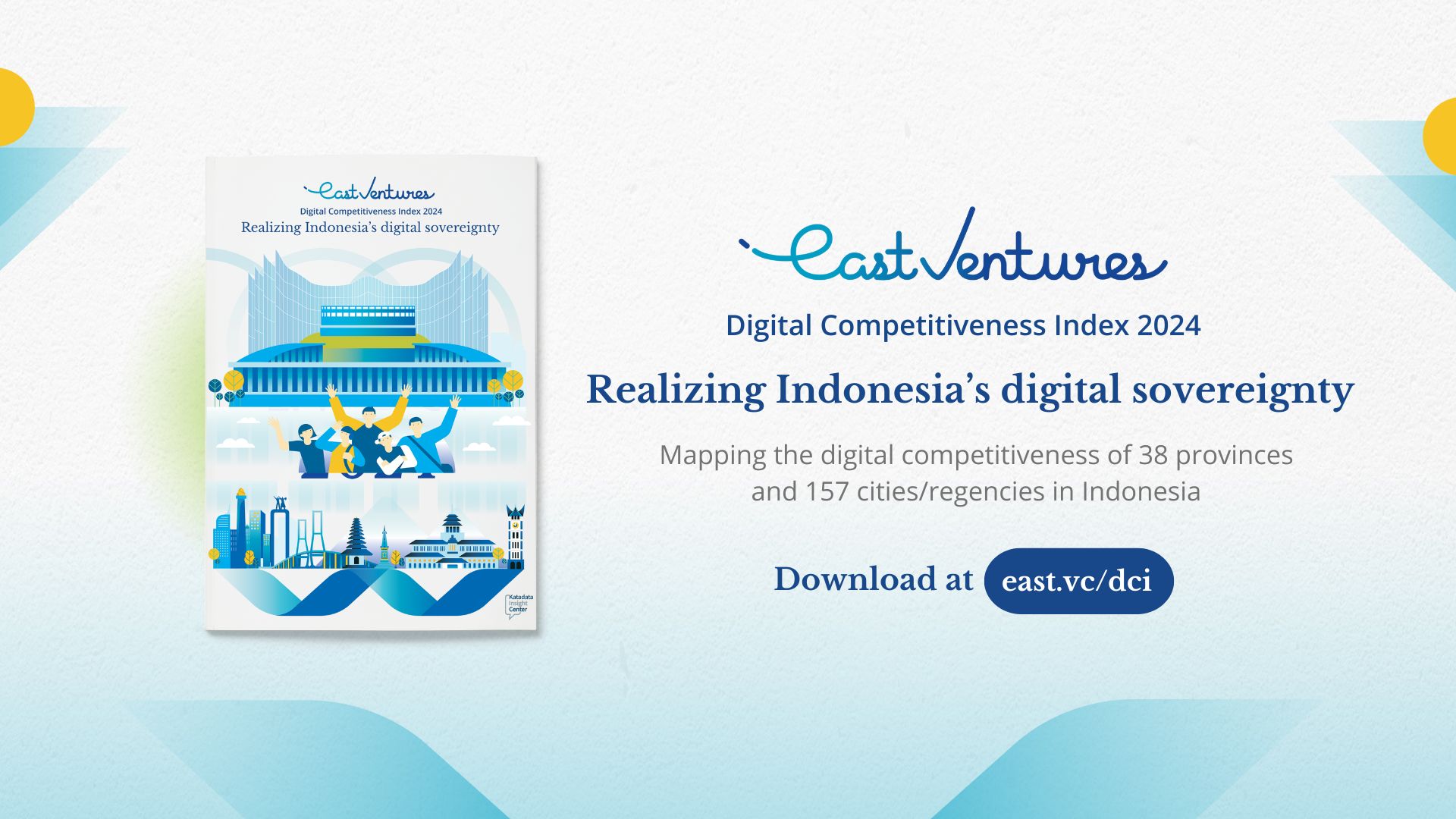East Ventures, a pioneering and leading sector-agnostic venture capital firm in Indonesia and Southeast Asia, together with Katadata Insight Center, today launched the East Ventures – Digital Competitiveness Index (EV-DCI) 2024. This marks the fifth edition since it was first launched in 2020. The EV-DCI 2024 research report maps Indonesia’s digital competitiveness with the theme “Realizing Indonesia’s digital sovereignty”. Digital sovereignty is a crucial aspect for countries, including Indonesia, to maximize digital development and become a driver of welfare betterment.
“We are pleased to present the East Ventures – Digital Competitiveness Index 2024 again. Since we launched this report in 2020, our commitment has remained the same: to promote inclusivity and collaboration to achieve digital equity and sovereignty for all Indonesians. We would like to thank all stakeholders who have contributed to building a sustainable and inclusive digital economy ecosystem,” said Willson Cuaca, Co-Founder and Managing Partner at East Ventures.
“We hope this report can serve as a reference and foundation for all related parties in continuously building Indonesia’s digital ecosystem. We believe this report is tangible proof of our commitment in preparing Indonesia to enter the early demographic dividend era, especially in building a stronger digital economy and shaping the ‘Golden Generation 2045’,” added Willson.
The EV-DCI 2024 provides data on digital competitiveness in 38 provinces and 157 cities/regencies in Indonesia. Digital competitiveness in various regions of Indonesia continues to show a positive trend, as reflected by the EV-DCI 2024 score of 38.1. This score has increased from previous years, which were 37.8 (2023) and 35.2 (2022).
In the EV-DCI 2024, the top 10 provinces with the highest scores are still dominated by provinces on Java Island, similar to the rankings in the previous year. Sequentially, these 10 provinces are (1) DKI Jakarta, (2) West Java, (3) East Java, (4) DI Yogyakarta, (5) Banten, (6) Bali, (7) Riau Islands, (8) East Kalimantan, (9) North Sumatra, and (10) Central Java. The four provinces outside Java that are in the top 10 consistently compete with the six provinces in Java.
To observe the overall development of Indonesia’s digital competitiveness, we can examine the movement of the index’s median value from year to year. The median value, which has improved consecutively over the past five years, indicates an overall increase in digital competitiveness across all provinces, especially in the mid-and lower-ranking provinces.
The spread or difference between the highest (DKI Jakarta—78.2) and lowest (Papua Pegunungan—17.8) provincial scores for EV-DCI 2024 is 60.4, which is larger compared to the previous year of 52.4 in 2023. This widening spread is influenced by various factors, including differences in each province’s digital development pace and the slowdown in development affected by macroeconomic factors impacting consumer purchasing power.
For example, despite both West Kalimantan and Gorontalo showing improvements in various indicators, Gorontalo’s development has been relatively faster than West Kalimantan’s. As a result, when comparing the index scores, Gorontalo’s score increased by 3.0 points, while West Kalimantan’s score decreased by 3.0 points.
In relation to the macroeconomic factors, Executive Director of Katadata Insight Center, Adek Media Roza, added that the reciprocal relationship between the macro economy and digital competitiveness requires a holistic view from the government. “The decline in the Information and Communication Technology (ICT) Usage and ICT Expenditure pillars, driven by weakened purchasing power due to inflation and other external pressures, exemplifies how macroeconomic situations affect efforts to strengthen Indonesia’s digital competitiveness. Therefore, the government needs to consider various factors that could hinder the growth of Indonesia’s digital competitiveness,”
Realizing Indonesia’s digital sovereignty
Amid the rapid global digital development, the digital sector has become a potential driver of economic growth for many countries, including Indonesia. Indonesia boasts significant digital economic potential, which is a crucial component in avoiding the middle-income trap and achieving the ‘Golden Indonesia 2045’ target. However, with no geographical boundaries in cyberspace, international connectivity is inevitable. Indonesia must ensure its digital sovereignty, which entails control over its digital infrastructure and the flow of data and information within its territory.
Strengthening digital competitiveness in a sustainable way is crucial to realizing Indonesia’s digital sovereignty. Indonesia continues to face various challenges in digital development, such as issues of equitable infrastructure development and human resources, which have been a focus of the government. Over the past 10 years, the Indonesian government has implemented various programs to enhance digital competitiveness, aiming not only for economic growth but also for broad societal welfare.
Programs like the MSME Go Digital initiative and the Digital Literacy program have shown positive results in strengthening the competitiveness of businesses and the community. Additionally, government digitization programs like the 100 Smart City Movement are designed to extend the benefits of digital development to governance. Such programs are expected to continuously improve Indonesia’s digital competitiveness.
Besides enhancing competitiveness, the Indonesian government has also developed various regulations and partnerships aimed at protecting the country’s digital sovereignty. The best outcome is to ensure that the rapid digital development and growing global connectivity will not lead to digital development that conflicts with Indonesia’s national interests.
About East Ventures – Digital Competitiveness Index 2024 score
The EV-DCI maps regional digital competitiveness through measurements of three sub-indexes, nine pillars, and 50 indicators. The sub-indexes are Input, Output, and Support. These sub-indexes comprise the pillars of Human Resources, ICT Usage, ICT Expenditure, Economy, Entrepreneurship and Productivity, Manpower, Infrastructure, Finance, and Regulations and Capacity of the Regional Government.
DKI Jakarta still holds the highest EV-DCI 2024 score, 78.2. West Java and East Java follow in second and third place, with 60.0 and 52.3, respectively. The top 10 provinces in the EV-DCI 2024 remain the same as in the EV-DCI 2023, though their rankings have shifted. In 2024, East Java moved up to third place, displacing DI Yogyakarta, which is now in fourth place.
Several provinces outside Java have shown significant improvements in digital competitiveness. For instance, Gorontalo has climbed 10 ranks in the EV-DCI 2024, moving from 30th place in 2023 to 20th place in 2024. This increase is the highest in the EV-DCI 2024. Other provinces with notable improvements include Southeast Sulawesi (from 29th to 21st), Riau (from 21st to 14th), and North Kalimantan (from 19th to 13th).
The EV-DCI 2024 report can be downloaded at east.vc/DCI.







